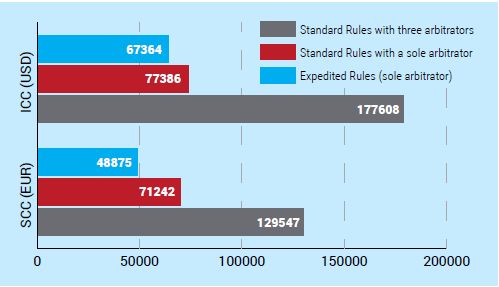Arbitration has now firmly established its position as a preferred dispute resolution mechanism in international business. The common view is that arbitration is much more convenient as compared to litigation given that it provides significant flexibility of the proceeding, ensures confidentiality and establishes a unified regime for the recognition and enforcement of arbitral awards. Leaving aside other advantages of arbitration, and there are indeed many of them, the parties are increasingly concerned with the cost and length of arbitration proceedings.
These concerns of the parties, and accordingly of the arbitration community, resulted in amendments being introduced recently to various arbitration rules with a view to accommodating the demands and expectations of users.
In general, there are two ways in which arbitration institutions respond to demands for more time- and cost-efficient arbitration proceedings:
- by establishing new procedural tools for streamlining the arbitration proceedings, such as rules for expedited formation of the arbitral tribunal, time frames for drafting and rendering the final arbitral award, and
- through establishing separate special types of proceedings, so-called expedited proceedings, which differ from the traditional proceedings and usually introduce tighter time schedules and, in some cases, lower arbitration and administrative costs.
Accordingly, depending on the approach taken by each arbitration institution, some arbitration rules may propose only certain additional provisions which provide for the improved efficiency of the procedure (e.g. the LCIA Arbitration Rules provide the expedited procedure only for the formation of the arbitral tribunal and appointment of a replacement arbitrator) and some arbitration rules include a special set of expedited provisions or even separate rules of expedited procedures (e.g. the ICC Arbitration Rules and the SCC Rules for Expedited Arbitrations).
Purpose and application of the Expedited Rules
Specific rules for expedited arbitration proceedings may be found in such arbitration rules as the 2017 SCC Rules for Expedited Arbitrations (SCC Rules), the 2017 ICC Arbitration Rules (ICC Rules), the 2016 SIAC Arbitration Rules (Singapore Rules), the 2013 HKIAC Administered Arbitration Rules (Hong Kong Rules), the 2013 Rules of Arbitration and Conciliation of VIAC (Vienna Rules), the 2012 Swiss Rules of International Arbitration (Swiss Rules) and others.
Just recently, the International Commercial Arbitration Court at the Ukrainian Chamber of Commerce and Industry made public the new version of its Arbitration Rules coming into force as of 1 January 2018 (Rules of ICAC at the UCCI). These Rules also contain specific provisions on expedited arbitration proceedings.
The idea behind such expedited rules is to provide for the most efficient procedure for low-value claims or less complex claims. This idea is based on the reasonable expectation that high-value claims are more likely to be complex and involve voluminous evidentiary materials. Accordingly, almost all of the mentioned arbitration rules, except for the Rules of ICAC at the UCCI, SCC Rules and the Vienna Rules, link the application of the expedited rules to the value of the claim and provide that such expedited rules shall apply, among other things, if the amount in dispute does not exceed:
- USD 2 million according to the ICC Rules;
- SGD 6 million (app. USD 4.47 million), according to the Singapore Rules;
- CHF 1 million (app. USD 1.055 million) according to the Swiss Rules;
- HKD 25 million (app. 3.2 million) according to the Hong Kong Rules.
But the expectation that low-value claims are less complex is not always true. There may be many cases where the amount in dispute would be USD 1 million or less but the dispute behind this amount would involve complex issues of application of foreign law, calculation of damages, inspection of the quality of goods, etc. Accordingly, the parties should normally expressly agree to the expedited proceedings. Moreover, opt-in, notwithstanding the value of the claim, is possible under all the mentioned arbitration rules.
Contrary to the above general approach, the ICC Rules and the Swiss Rules provide for the automatic application of the relevant expedited arbitration rules if the value of a claim does not exceed USD 2 million and CHF 1 million, respectively. Such automatic application of the expedited rules in the ICC Rules and the Swiss Rules is, however, bal anced by the right of the relevant arbitration institution to decide on the application of the general procedure in view of the case's complexity. It should also be noted that unlike the ICC Rules, the Swiss Rules do now allow for opting out of the expedited procedure where the established threshold of the claim value is not exceeded.
Since the decision of the arbitration institution on application of the general rules instead of the expedited in case of the ICC Rules and Swiss Rules may not always coincide with the position of a party or parties to the dispute or their strategical needs, this should be taken into account by the parties when choosing to include a reference to the ICC Rules or the Swiss Rules in an arbitration agreement.
The SCC provides an alternative approach in suggesting several different model clauses to the parties. The parties could either choose standard (non-expedited) SCC Rules or expedited SCC Rules, or even a combined clause with expedited SCC Rules as a first choice (in this case the SCC will retain a discretion taking into account the complexity of the case, the amount in dispute and other circumstances so as to apply standard SCC Rules) or a value-based combined clause (the application of expedited SCC Rules and choice between a sole arbitrator or three arbitrators will depend on the amount in dispute).
Principal features of the expedited arbitration rules
Turning to the mechanisms for making the arbitration proceedings more efficient, expedited arbitration rules propose the following principal measures:
- combining in one procedural step of filing a Request for Arbitration and a Statement of Claim and, respectively, a Reply to the Request for Arbitration and a Statement of Defense and/or limitation of the number of the parties' written submissions;
- introduction of tighter deadlines for written submissions from the parties and other procedural steps, including for drafting and rendering the final arbitral award;
- giving preference to the arbitration with a sole arbitrator instead of the panel of three arbitrators, and
- limiting hearings (usually at the request of the parties).

Combination of written submissions, their limited number, length and scope
Expedited arbitration rules tend to limit the number of written submissions from the parties, as well as address unnecessary delays between filing of a Request for Arbitration and a Statement of Claim and further submissions by the parties.
For example, in practice, there are cases where more than one year passes between the filing of a Request for Arbitration with little particulars of the claim and a Statement of Claim containing the full case of a claimant. Leaving aside cases when this happens due to the agreement of the parties or due to the progress of settlement talks, such a situation is not entirely efficient.
To overcome this problem, the SCC Rules implemented the new rule according to which a claimant's Request for Arbitration constitutes a claimant's Statement of Claim and, respectively, a respondent's Reply to the Request for Arbitration constitutes a respondent's Statement of Defence. This approach will significantly shorten the period between the commencement of proceedings and receipt of the parties' written submissions by the arbitral tribunal. Under the SCC Rules, it is expected that the parties will further make only one additional round of written submissions.
The Rules of the ICAC, in principle, also follow this approach and provide that in addition to a Statement of Claim and a Statement of Defense, a further round of submissions is possible if the circumstances so require.
The Vienna Rules, the Swiss Rules, and the Hong Kong Rules establish a slightly different approach, which will also help to save time in the course of the proceedings. According to this approach, the parties in principal are expected to submit in addition to their Request for Arbitration and Answer only one additional round of written submissions, while according to the ICC Rules, the arbitral tribunal is also entitled to establish further limitations on the length and scope of such written submissions.
Tighter Deadlines
So as to achieve greater effect in making the arbitration fast and efficient, the expedited rules also tend to cut deadlines for different procedural steps in the arbitration proceedings. This effect is mainly achieved through establishing general time limits for rendering a final award in the course of the proceedings. The usual approach is to set six months for rendering the final award from the date the case is referred to the arbitral tribunal (the Vienna Rules, the Swiss Rules, the Hong Kong Rules), or from the date of constitution of the arbitral tribunal (the Singapore Rules), or from the date of the management conference (the ICC Rules). The SCC Rules establish an even shorter deadline of three months from the date the case was referred to the arbitrator. The Rules of ICAC, in contrast, set a time limit for rendering a final award within twenty days of the hearing.
In addition, the expedited rules also establish a general requirement to the arbitrators and parties to the dispute to act in an efficient and expeditious manner.
Naturally, if the circumstances so require, the respective deadlines could be reasonably extended. However, the existence of an overarching time limit for the rendering of the final award and cutting off of other procedural deadlines in reality contribute greatly to the efficiency of the arbitration proceedings.
Sole arbitrator vs. three arbitrators
All expedited arbitration rules give preference to the sole arbitrator instead of the panel of three arbitrators. From the practical perspective, involvement of one arbitrator instead of three arbitrators is always a better option when the efficiency of the arbitration proceedings is a key goal. A sole arbitrator may be appointed substantially quicker and will definitely be cheaper for the parties.
Although a sole arbitrator will contribute to the efficiency of the expedited procedure, most of the expedited arbitration rules still give preference to the agreement of the parties. In order words, it the parties insist on the panel of three arbitrators, they will be entitled to have a panel of three arbitrators to resolve their dispute.
This approach is not maintained maintained, for example, in the ICC Rules, which quite unusually provide that a sole arbitrator may be appointed in all cases notwithstanding any contrary provision in the arbitration agreement.
Hearing
The general approach to the hearing in expedited procedures is to avoid it to the extent possible with due regard to the complexity of the case, witnesses and experts involved and other relevant considerations. The position of the parties on whether there is a need for the hearing is crucial and will have a significant impact on the decision of the arbitral tribunal on holding the hearing.
Do expedited proceedings save costs?
Turning to the issue of costs, the main question is whether all the above features of the expedited arbitration rules actually result in cost savings.
Among all the expedited arbitration rules considered in this article only the SCC Rules and the ICC Rules specifically provide for reduced fees in case of expedited arbitration proceedings.
The extent of cost savings may be seen from the cost comparison chart above created with the use of the official fee calculators of the ICC and the SCC and based on the assumption that the amount in dispute will be USD/EUR 1.5 million and the dispute will be resolved by either a sole arbitrator or three arbitrators.
Since both SCC Rules and ICC Rules allow opting in their expedited rules notwithstanding the amount of the claim, expedited proceedings could potentially be used for the purpose of saving costs. This option, however, should be carefully considered against the background of the dispute and its complexity.
However, as seen from the cost comparison chart, an even more significant cost saving option is for the parties to agree to a sole arbitrator instead of three arbitrators using standard (non-expedited) arbitration rules. From the practical perspective, the best time to agree to a sole arbitrator is when the relevant contract with an arbitration clause is being negotiated. Once the dispute arises, the parties will most likely not be cooperative to any amendments to the number of arbitrators.
Practical thoughts
The expedited arbitration rules are structured in such a way as to allow arbitration proceedings to be concluded swiftly. However, in a complex dispute with voluminous factual background, numerous witnesses and experts, any additional pressure on the timetable may, in fact, obstruct the legal counsels from proper presentation of a case of their client rather than provide any real advantages.
Due to these considerations, the parties should be quite careful in agreeing to the application of expedited arbitration rules, particularly so in cases where according to the chosen arbitration rules the expedited procedures apply by default if the amount in dispute does not exceed a certain threshold.
At the same time, if on the basis of the relevant contract it is clear that the disputes which are likely to arise from such a contract will not be complex from the point of law and facts, it might well be a good option to agree to expedited arbitration from the beginning.
And if cost cutting is the primary concern, the parties should be aware that opting for arbitration under standard (non-expedited) arbitration rules with a sole arbitrator instead of a panel with three arbitrators, will often provide much more significant cost savings compared to opting for expedited arbitration rules.
Originally published in The Ukrainian Journal of Business Law, October 2017
The content of this article is intended to provide a general guide to the subject matter. Specialist advice should be sought about your specific circumstances.


